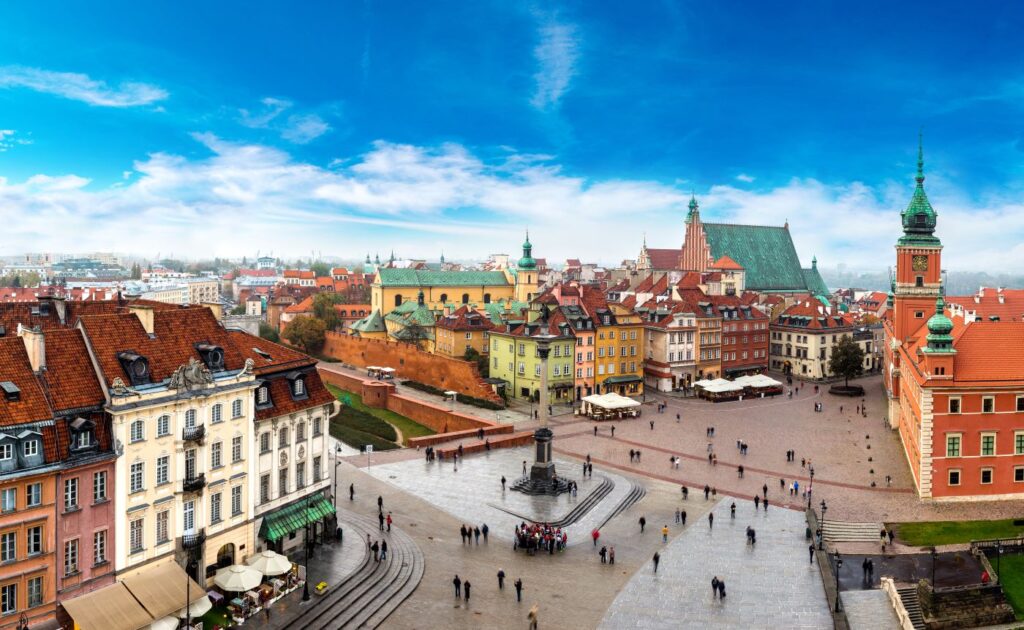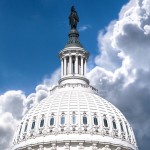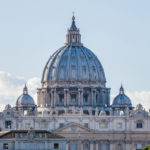For several years, Western media created a false narrative that Poland had descended into an “illiberal,” “anti-democratic,” oppressive state ruled by a “nationalist” regime bent on turning its back on “progress.” But the recent election, with an incredible voter turnout of nearly 73 percent, reveals the health of the Polish democratic process and Poles’ ongoing recognition of the importance of building a free Poland.
At the same time, Poland’s current political situation is quickly devolving into the power politics of revenge, and the new ruling coalition is seeking a “reckoning” after eight years of conservative Law and Justice rule. In its first month of legislation, the government has already introduced bills to expand abortion rights, arrested political opponents, and pursued legally questionable actions to purge institutions of Law and Justice influences. In its majority rule over the last eight years, Poland’s Law and Justice Party oversaw continued economic growth and expansion, aligned itself more closely with the United States, instituted judicial reforms, abolished the teaching of LGBTQI+ ideology in public schools, and proposed a vision of a strong Polish republic that could reassert itself as a European power. For many conservatives in the West, the party became a model for a politics faithful to Christian culture and national values over and against the secular humanism infecting many liberal democracies.
Although Law and Justice still won a simple majority of the votes in the elections in October of 2023, they were unable to secure enough support to form a ruling coalition, which places them in the minority opposition to the alliance formed by the center-left Civic Platform party, the far left progressives, and the centrist “Third Way” party.
A Changing Culture
Start your day with Public Discourse
Sign up and get our daily essays sent straight to your inbox.The recent election clearly shows that the Poland of today is no longer the Poland of the 1990s or even of the early 2010s. It raises the question whether Poles have sustained the kind of culture necessary to build a market society based on authentic freedom and the truth about the good, one with a robust civil society to support both the logic of the state and the logic of the market.
Recent statistics reveal that one should not be optimistic about the ability of Poland to continue to craft a unique vision of democracy that accords with Gospel values. In many ways, the Catholic Church has failed to convince Generation Z of the joy of living the Gospel. Entrenched institutional clericalism and recent clergy sex scandals have left many people disillusioned with the Church. Some have perceived an inappropriate alliance between some of the Church’s ministers and the Law and Justice party, with many fearing that the party instrumentalized the Church for its own political ends.
As in many places, the effects of Covid-19 lockdowns have exacerbated a decline in weekly Mass attendance. Between 2011 and 2021, the number of Poles who identify as Catholic dropped from 88 to 71 percent, Mass attendance has fallen from 46 percent to 28 percent over the last decade, and the number of priestly ordinations has dropped from 5,367 in 1992 to only 1,341 in 2022. Catholic marriages have fallen from 230,000 annually in 1990 to 103,000 in 2021. Particularly worrying are the trends among young people: only 23 percent of members of Gen Z attend Mass regularly, while a full one-third now profess to be unbelievers (a number that has doubled since 2015). Official acts of apostasy are at a record high, propelled by videos of influencers and celebrities encouraging young people to leave the Church in Poland.
Perhaps because they have rejected their faith, Poles between eighteen and twenty-nine are much more secular. They are also more concerned about upward social mobility, often at the expense of marriage and family life, and Poland faces a looming demographic cliff. The birth rate has fallen by 40 percent in thirty years to the fourth-lowest birth rate in Europe (1.33). A recent study of Polish women found that 68 percent between ages eighteen and forty-five plan on never having a child. Unless these trends change, Poles can expect their economic boom to end, and the economy to start shrinking by 2050.
By Reason or Force?
The Law and Justice party failed to persuade most younger voters of its vision of a Poland true to its Catholic roots, focused on its national sovereignty, and defending traditional moral values. Yet it is clear that the new election results simply reflect the changing nature and shape of Polish society. Younger Poles want material comforts, “respect” in the eyes of their European partners, influence in European politics, and more liberal social policies. But should the primary task of Polish politics be to “have” all these things? Their beloved Saint John Paul the Great might call for some serious self-examination.
The temptation to appear respectable, experience the material comforts of consumerism, and pursue “progress” as proposed by the technocratic paradigm is strong. If Poles give up the task of strengthening their moral and cultural scaffolding, the project of building their democracy in a manner conformed to the “innate human and moral values which flow from the very truth of the human being” will fail. St. John Paul II reminds us that the “value of democracy stands or falls with the values which it embodies and promotes.” Given many sharp divisions on moral issues like the role of the Church in schools, public life, and public institutions, the nation and its politics are descending to a struggle of parties vying for control, not only due to petty interests but also to diametrically opposed visions of Poland’s culture and history. Yet power politics are not what St. John Paul II proposed to the young democracy.
The “Polish Truth”
The words plus ratio quam vis are etched into stone above the main door to the 600-year-old Collegium Maius of the Jagiellonian University in Kraków. This phrase, “reason rather than by force,” surely influenced the young student of the university, Karol Wojtyła, as he discerned his vocation there. Throughout his pontificate, he called faith and reason, truth and freedom, essential to a civilization of truth and love. When politics ceases to serve civil society, this “noble art” does not operate “by reason rather than by force,” but by the strong arm of the bureaucratic state.
If politics is downstream from culture, only a true Christian culture will ensure that Poland’s young democracy will continue to uphold the truth about the dignity of the human person and a robust notion of the common good. Would John Paul II still be able to say of young people in Poland today what he said at Westerplatte in Gdańsk in 1987: “I desire to tell your contemporaries in various places around the world . . . that there are young people in Poland who desire a better world, a more human world, a world of truth, freedom, justice, and love”? He might encourage them to “be not afraid,” to not give in to passing joys and satisfactions, but to commit themselves to lives of communion and charity ordered to the common good.
This was the difficult message he brought to his countrymen after the fall of the Iron Curtain. With the collapse of the foreign-imposed communist system, which sought to systematically repress authentic Polish and Catholic culture in favor of Marxist ideology, John Paul II proposed a vision of a free Poland to the Polish people. “My wish for my countrymen and for Poland is that she will be able in this precise way to be faithful to herself and to the roots from which she has grown.” For John Paul II, these roots were inseparable from Christ and the Catholic Church. He famously preached in Warsaw’s Victory Square: “The Church brought Christ to Poland—that means, the key to understanding the great and fundamental mystery that is man. For man cannot be fully understood without Christ. . . . It is also impossible to fully understand Polish events without Christ.”
Yet many Poles were quite shocked when “their” pope, who had come in the 1980s as a powerful friend and ally standing for human rights, returned to Poland in the 1990s more as a stern father. While his messages in the 1980s focused on the need to respect civil liberties, human rights, and the dignity of every human person, his messages a decade later issued warnings about the allure of shallow materialism and secular human values; the now-free people had to be reminded that true freedom was a task and responsibility.
The transition to a “new Poland” involved the difficult task of bringing together many segments of society to implement the Balcerowicz Plan of “shock therapy” to free markets and to foster business and private enterprise (1989–1992), to debate contested issues such as abortion (1990–1993), to pass a new constitution (1997), to join NATO (1999), and to integrate into the European Union (2004). John Paul II upset many Poles who during this time thought that “freedom” meant the uncritical acceptance of Western trends—from media to fashions to business models. The pontiff argued that freedom was not an end in itself, but needed to be at the service of the authentic and difficult truth about the good.
John Paul often led his fellow Poles from various social sectors in a communal “examination of conscience.” Drawing on the fortitude, patience, and merciful love of Queen St. Jadwiga (1373–1399), John Paul reminded Poles during this period:
Let us think about this “Polish truth.” Let us think about whether it is respected in our homes, in the means of social communication, in public offices, in parishes. Does it not sometimes escape us under the pressure of circumstances? Does it not become distorted, simplified? Is it always at the service of love? Let us think about “Polish practice.” Let us see whether it is carried out with prudence. Is it systematic and persevering? Is it courageous and magnanimous? Does it unite people or divide them? Does it treat anyone with hatred or contempt? Or is there too little practice of love, of Christian love?
During this period, the Roman Catholic Church in Poland, the bulwark of solidarity and Christian love that had united many diverse people within it in opposition to communism, experienced both a defection of those members from the political Left and a period of remarkable growth. Especially throughout the 1990s and into the 2000s, among the “John Paul II generation,” which had come of age during the nine papal visits to the homeland, the Church in Poland experienced a “new springtime.” The fruit of this springtime was seen in a surge of vocations to priestly and religious life (by the turn of the millennium, there were nearly 7,000 men in seminary formation), with one-third of Europe’s priestly vocations coming from Poland, and many priests and religious women and men being sent as missionaries (and martyrs) to Africa, South America, and western Europe (especially to minister to the two million Poles in the UK). Pope Benedict XVI visited and lauded Poland in 2006, encouraging the “Polish nation [to] always be guided by sentiments of mercy, fraternal solidarity, and dedication to the common good,” so that Poland “would not only find her proper place within a United Europe,” but also so that Poland could “enrich this continent and the whole world with her tradition.”
Toward Which Kind of Freedom?
It remains to be seen whether Poland “enriched” Europe with her tradition. Poles have certainly become incredibly materially enriched and are economically more successful than one generation ago. But have they prioritized having more over “being more?” Poland, as Europe’s fifth largest economy, is also one of the fastest consistently growing economies, which explains its appeal to foreign corporations making massive investments in recent years, especially in the rapidly growing tech sector. The tenfold increase in average wages, a decrease in the real poverty rate, and a smaller income inequality gap than in other developed nations are truly impressive changes.
While pursuing free-market policies that contributed to economic success, the Law and Justice party aligned itself with “progressive” social causes including various redistributive programs like the “800+” program, which provided monthly child benefit payments to Polish families, as well as “conservative” issues, including restricting abortion, opposing same-sex marriage, and forbidding government funding of in vitro fertilization. The party’s victory and popularity in the elections both of 2015 and 2019 seemed to indicate the desire of many in Poland to take to heart John Paul II’s message: they appeared to want a democracy that would stand because of the values that it promotes, rather than a political society as in the secularized nations of western Europe, where democracy is “idolized to the point of making it a substitute for morality or a panacea for immorality.”
Recent trends, however, raise several questions: Are there still young people in Poland who seek a world of authentic truth, freedom, justice, and social charity? Do they want to be a country that “enriches” Europe with a real Christian democracy and its Catholic traditions? Or do Poles desire a nation that, while materially wealthier and politically more popular, seeks the kind of “progress” in which freedom and truth, love and responsibility, have come completely untethered from one another?
One small part of the answer may lie in what the Catholic Church and its leaders will do. The threats of communism are long gone; bishops and pastors must now respond to the rapid secularization of Gen Z. They must find the young and accompany them in their search for truth, beauty, and goodness, as well as the joy of knowing Christ, who is inseparable from his Church. Given the erosion of its prestige and of trust in its institutions, the Polish Church and its hierarchy will need to shun any form of clericalism of ages past to adopt a radically evangelical stance. They will need to form the laity as the primary agents of evangelization, recognizing their role in shaping secular decisions. They should also provide formation to help people encounter the joy of the Gospel, which cannot be constrained by or identified with any political party or power system. Plus fides et ratio quam vis.
Image by Sergii Figurnyi and licensed via Adobe Stock.














